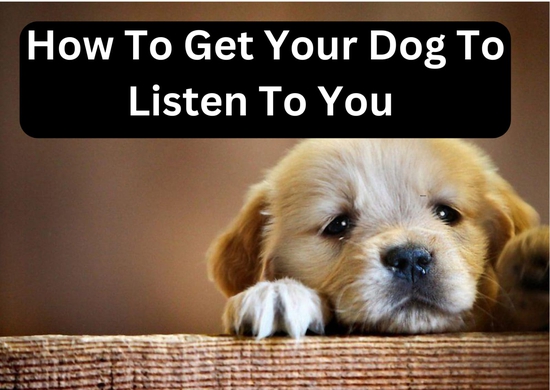
How To Get Your Dog To Listen To You
How To Get Your Dog To Listen To You
When your dog won’t listen to your commands, it can be frustrating — and it can also be dangerous. After all, this kind of communication can help keep your dog out of trouble, preventing him from running out into a busy street or eating something he shouldn’t. It can also help keep you sane by helping you manage problem behaviors.
But it’s not always easy to get to the root of the problem. So where do you start if your dog doessn't obey either in specific situations or all of the time? Here are a few problems you may be encountering.

Remove Excess Energy
Dogs with excess energy can be challenging to manage as they might become destructive, overly excited, or engage in unwanted behaviors. Removing or managing this excess energy is crucial for a peaceful coexistence with your pet and for their overall well-being. Here's a detailed breakdown of how to remove or manage excess energy in dogs:
1. Regular Exercise:
- Daily Walks: Two walks a day can help in reducing energy levels. The length and intensity of the walk depend on the breed and age of the dog. Active breeds will require longer and more vigorous walks.
- Running: If you're a runner, take your dog along. This is especially good for high-energy breeds.
- Fetch: Games like fetch can burn energy quickly. It's also a great bonding activity
- Swimming: If your dog likes water, swimming can be an excellent way for them to use up energy.
2. Mental Stimulation:
- Training Sessions: Regularly teaching your dog new commands or tricks can tire them mentally.
- Interactive Toys: Toys like puzzle feeders, where they have to figure out how to get a treat, can keep them engaged.
- Hide and Seek: Hiding treats or toys around the house and asking your dog to find them can be both mentally and physically stimulating.
3. Play Dates:
- Socializing with other dogs can help burn a lot of energy. Organize or attend doggy playdates, or visit a dog park.
4. Agility Training:
- Set up agility courses in your backyard or enroll your dog in an agility class. This provides both physical exercise and mental stimulation.
5. Tug-of-War:
- Playing tug with a sturdy toy can be a good way to use up energy. Ensure it's played under supervision and with rules to prevent any aggressive behavior.
6. Consistent Routine:
- Dogs feel more relaxed and are less likely to have pent-up energy when they have a consistent daily routine.
7. Chewing:
- Provide safe toys or bones for chewing. Chewing can be a way for dogs to self-soothe and tire themselves out.
- If your dog knows basic commands, move to more advanced ones or teach them fun tricks.
9. Enroll in Classes:
- Obedience classes, scent detection classes, or even herding classes (for specific breeds) can be a great way to channel their energy.
10. Dog Sports:
- Depending on the breed and interest of your dog, you can engage them in dog sports like flyball, disc dog, dock diving, etc.

11. Hiking:
- If you're near nature trails, take your dog hiking. The varied terrain and new smells are both mentally and physically engaging for them.
12. Hire a Dog Walker or Use Daycare:
- If you're unable to meet your dog's energy needs due to work or other commitments, consider hiring a dog walker or sending your dog to daycare a few times a week.
13. Calming Activities:
- Activities like gentle petting, massage, or even playing soft music can help calm an overly energetic dog.
Managing a dog's energy levels requires a combination of physical activities, mental stimulation, and consistent routines. By ensuring your dog's energy is channeled appropriately, you'll have a happier, healthier pet and a more harmonious living environment.
Be Consistent
Personal Development:
- Building good habits or trying to kick bad ones requires consistency. Whether it's exercise, meditation, or studying, doing something regularly reinforces the behavior and leads to greater success.
Parenting:
- Consistency in parenting means setting clear expectations and following through with rewards or consequences. This provides children with a sense of security and understanding of what is expected of them.
Business:
- Consistency in branding, messaging, and product quality helps businesses build trust with their customers. A consistent experience is key to customer loyalty.
Learning:
- Repeated exposure to new information or skills can lead to better retention. This is why spaced repetition techniques are popular in effective learning strategies.
Relationships:
- Being consistent in how you treat others, in communication, and in fulfilling promises builds trust and deepens relationships.
Diet and Health:
- Maintaining a consistent diet and sleep schedule can lead to better overall health and well-being.
Investing:
- Consistently investing a fixed amount over time (dollar-cost averaging) can reduce the impact of market volatility.
Sports and Hobbies:
- Regular practice leads to improvement. Whether it's a musical instrument or a sport, consistency aids in mastery.
Master Your Energy
Dogs listen to their pack leaders, and you can only be that leader if you are displaying calm-assertive energy. If you’re frantic or uncertain as you give a command, your dog will tune you out. Unfortunately, many of us aren’t really aware of the energy we are giving off.
Stop Relying on Verbal Commands
Dogs don’t speak to one another; they use energy and body language to communicate. So it’s not surprising that they sometimes have trouble picking up on our vrebal commands, particularly when they are bombarded by our constant yammering all day.
Even if they know a command, they may actually associate it more with a non-verbal cue you give at the same time — something you may not even realize you’re doing.
If your dog is listening to you, consider what may have changed about your physical presence. Are you holding a baby? Are you sitting down? Are you looking away? Small changes like these may be impacting your ability to fully communicate your message like you normally would.
Notice Your Dog’s Emotional State
Noticing your dog’s emotional state is critical for maintaining a healthy and happy relationship with your canine companion. By being attentive to your dog's emotions, you can ensure they feel safe, understood, and cared for. Here's how you can better understand and respond to your dog's emotional state

Body Language:
- Tail Position: A wagging tail often means a happy dog, but a tail held high can indicate alertness or dominance, while a tail tucked between the legs can indicate fear.
- Ears: Forward ears indicate attention, while ears laid back can mean fear, aggression, or contentment depending on the context.
- Posture: A relaxed posture usually indicates contentment, whereas a stiff posture can be a sign of alertness or potential aggression. A cowering posture often indicates fear.
Facial Expressions:
- Eyes: When a dog is afraid or anxious, the whites of their eyes (sclera) may become more visible. This is often referred to as "whale eye."
- Mouth: A relaxed, open mouth can indicate contentment. Lips pulled back can be a sign of aggression or fear.

Vocalizations:
- Barking: Dogs bark for various reasons – attention, boredom, anxiety, alerting to strangers, etc. The tone, frequency, and duration can provide clues.
- Growling: This is a warning. Never punish a dog for growling as it's their way of communicating discomfort before possibly escalating to biting.
- Whining: This can indicate anxiety, pain, or a desire for attention.
Behavioral Changes:
- A sudden change in behavior can indicate a health problem or emotional distress. If your dog becomes more aggressive, reclusive, or has changes in appetite or energy levels, consult a veterinarian or a pet behaviorist.
Context is Key:
- Understand the context in which certain behaviors occur. For instance, a dog might be wagging its tail while growling. This doesn’t necessarily mean they’re happy. They might be conflicted, anxious, or even aggressive.
Engage in Positive Training Techniques:
- Reinforce positive behaviors and gently redirect or dissuade negative ones. This fosters trust and helps in better understanding your dog's needs and emotions.
Spend Quality Time Together:
- Engage in activities your dog loves. This strengthens your bond and helps you to better notice any changes in their emotional state.
Consider Enrichment Activities:
- Toys, puzzles, and training sessions can stimulate your dog mentally and emotionally.
Socialization:
- Expose your dog to different people, places, and other animals. This helps them become more emotionally resilient and better adjusted.
Seek Expert Help:
- If you're struggling to understand or address your dog's emotional state, don't hesitate to seek help from professionals like veterinarians, trainers, or animal behaviorists.
In essence, by paying attention to your dog's emotional cues, you can anticipate their needs, reduce stressful situations, and ensure a deeper, more trusting relationship. Remember that every dog is unique, and it's essential to tailor your approach based on your individual dog's personality and experiences.
Blog Upload on - Aug. 17, 2023
Views - 2155

posted By -
Animals Super Store
Related Posts
-
Green Anaconda
April 8, 2023 -
Top 10 Smartest Dog Breeds
March 15, 2023 -
Top Natural Foods for Dogs
Oct. 21, 2022 -
Eastern Tiger Snake
May 11, 2023 -
Sheep Farming Business
Nov. 1, 2022 -
 Vaccination Of Goat And Sheep
Vaccination Of Goat And Sheep
Nov. 7, 2022 -
 Types Of All Dog Breed Names A to Z
Types Of All Dog Breed Names A to Z
Nov. 16, 2022 -
A to Z List of Bird Names With Picture
Sept. 14, 2023


I see that your site is very informative, and every article is better than any other website's blog and articles. Your blog contains more information than any other. I think you are one of the best informative article writers, also I am sure you are. Somehow, I found another informative blog site that contains more information same as you. If you want more information about farming, then you can visit farmingplan.com sites. Farming Plan